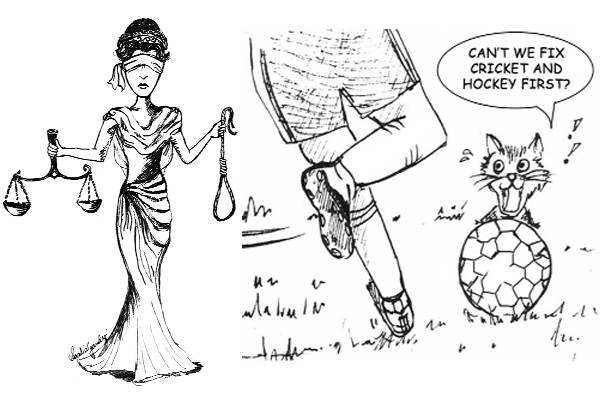
Diplomatic duel
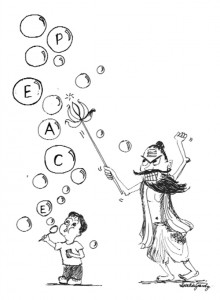
Sir,
The belligerent Indian Prime Minister, Narendra Modi, reportedly told the Chinese leadership during his recent visit to China that the multibillion-dollar China–Pakistan Economic Corridor (CPEC) was “unacceptable” to India. At a recent news conference in New Delhi, the Indian external affairs minister, Sushma Swaraj, confirmed this vociferously, adding that the Indian government had summoned the Chinese envoy with regard to the issue, while the Indian envoy in Beijing had also raised the matter with the Chinese authorities.
This audacious stance endorses the concerns expressed by Pakistan, time and again, that India is responsible for creating unrest in Balochistan and elsewhere with the express intention of sabotaging the CPEC, which could well prove to be a “game changer” for the region. China’s straightforward response is, however, very encouraging: a day after India reaffirmed its objection to the project, China categorically said that the construction of the CPEC would “not target any third party.” The international media reports that Chinese Foreign Ministry spokesperson Hua Chunying has said that the USD 46 billion economic corridor is part of a major cooperation framework between the two countries. “It is not only of great significance for promoting the development of China and Pakistan, but also of great significance to the stability and development of the whole region,” she said.
Responding to Sushma Swaraj’s statement that India’s objection to the CPEC is based on its proposed route through Azad Kashmir, Hua Chunying has clarified that the Kashmir region “is an issue between Pakistan and India. This issue should be properly resolved through negotiations and consultations between India and Pakistan.”
The question that arises is this: will India, for once, endeavour to accept in good faith China’s explicit clarification regarding the CPEC? At least when seen against the backdrop of India’s frequent somersaulting vis-à-vis its relations with Pakistan, chances seem fairly bleak.
M. Fazal Elahi,
Islamabad.
Let them eat cake
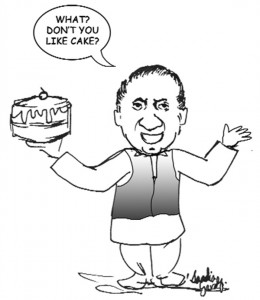
Sir,
The Economic Survey unveiled by the finance minister in early June shows that Pakistan’s literacy rate has remained unchanged. This should be a matter of national shame: 42 percent of our population is unable to read or write even as our leaders were busy inaugurating the metrobus project in Rawalpindi – for which the finance minister had to delay his press conference. Invariably, the political leadership aligns its priorities with its own interests and without looking the merits or demerits of a mega-project such as this.
Not only is Pakistan’s literacy rate in serious trouble, the country also faces an acute shortage of specialized educational institutions. We need more colleges and universities – not one or two extravagant mega-projects. The same amount could have been used to establish educational and training institutions in areas that need them sorely.
The development of a country cannot be judged by the construction of roads and bridges, but by people’s living standards – a measure that, in Pakistan, is declining day by day. It is a cruel joke to think that our leaders are prepared to let the people “eat cake if bread is not available.”
No doubt, the development projects introduced and completed in record time by the PML (N) government will go down in history as landmark steps. Indeed, credit goes to Mian Shahbaz Sharif for his dynamic leadership. But it would have made far more sense to use the available funds for projects that would have directly translated into better living conditions for the poor: the provision of medical facilities, better sewerage systems, clean drinking water, and improving smaller roads and streets in undeveloped areas. The beautification of cities is a duty of any government, but never at the cost of neglecting the underprivileged; rather, preference must be given to the latter.
What percentage of Lahore’s population is really benefiting from this mega-project? Could the same amount not have been spent on improving the city’s overall public transport system or on new buses for other routes? Above all, unless we divert funds to establishing a better education system, to improving people’s access to schools and focusing on the quality of education provided, we will never achieve the dream of a “parha likha Punjab”. The country’s precarious law and order situation also demands that we work on a war footing in the field of education.
Aamir Aqil,
Lahore.
Missing necklace
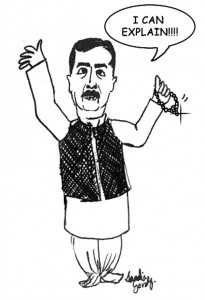
Sir,
This is with reference to the shameful revelation by Interior Minister Chaudhry Nisar that the necklace donated to Pakistan by Emine Erdogan, wife of the Turkish President, went “missing”. It is even worse when we consider that she donated the necklace – a personal possession – in aid of flood-affected people the year she visited the country.
The incident reflects the vulture-like mind-set of our public office holders who consider it their right to dip into Pakistan’s assets and natural resources at the expense of the poor. This is not so much a lack of nationalism as a simple question of greed: after all, one can be corrupt and a “nationalist” at the same time.
Given this petty and despicable crime, the public has a right to know where the millions of dollars donated to helping victims of natural disasters disappear. Why are such funds pocketed by the few who, as holders of public office, have taken an oath to protect the Constitution and serve the people, but end up doing the reverse?
Malik Tariq,
Lahore.
Reason to fume
Sir,
An unregistered distemper and paint manufacturer recently began to operate in our residential area. This has led to unacceptable levels of air pollution in a locale that was, until now, a clean and unpolluted neighbourhood. Additionally, the manufacturer’s presence means that the traffic flow here has increased, with lorries constantly moving in and out of the area. During the day, the noise of the lorries and the dust produced by the distemper factory are virtually unbearable. Further, to our horror, we have discovered that the company is using drinking water to manufacture the distemper.
On behalf of the residents of Sultan Mehmood Road in Rangwala Karkhana, I would like to request the authorities to take the necessary steps to minimize the pollution created by the distemper manufacturer and the lorries.
Nadeem Afzal,
Lahore.
Metrobus
Sir,
I recently travelled on the metrobus from Islamabad to Rawalpindi. The state of the vehicles and stations and the helpfulness of the staff surpassed my expectations. However, I feel there should be a partition between the seating areas for men and women on each bus. This would make traveling more secure for women and staff members would not have to remind male passengers to keep to the area designated for men.
There should also be a fixed number of passengers allowed to stand in the bus. Staff members should check to see how many people are standing in the aisle before allowing additional passengers to board the bus: this would prevent overcrowding and discourage pickpockets. Nonetheless, I am grateful to the federal and provincial governments for this initiative.
Khalid Mustafa,
Islamabad.
Play ball

Sir,
Football remains a hidden talent in Pakistan. Not only is Sialkot the world’s largest producer of hand-stitched footballs – the city’s factories supply some 40 million footballs a year and this number rises to 60 million in European championship or FIFA World Cup years – but also, people’s passion for the sport has soared in recent years. It is becoming more and more common to see people supporting their favourite international clubs and teams. Even more encouragingly, the Pakistan women’s football team is working hard and has moved up to 126 in the rankings.
Unfortunately, the men’s football team still stands at 173. This is despite the fact that, according to Reuters Sports, FIFA has spent $2.38 million in Pakistan under its Goal program. Yet only one football project was completed successfully and not a single training or playing facility has been made operational.
We have many highly talented football players in this country who are simply waiting for an opportunity to fulfil their dreams of playing at the international level. Football fans, too, want to support their national team at world-class matches. But players need a platform to perform: this will only be possible once the Pakistan Football Federation takes more interest in promoting the sport and working to take its team to the international level. This means investing in football in the same way that the PCB invests in cricket. It means arranging leagues, finding and testing young talent, creating a strong team, and taking them to other countries to play friendly matches.
Mohammad Abraq,
Lahore.
Germans on motorcycles
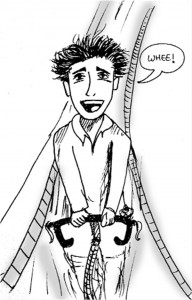
Sir,
What is lacking in Pakistan at the moment is a sense of love for the nation. We need more people willing and able to create situations and policies that not only improve public welfare, but also improve the country’s world image. This has to come from within each individual.
Recently, a small group of German motorcyclists wanted to ride from India to Germany via Pakistan, but were told by the authorities outside to avoid traveling through the country. Moin Khan, a young man from Lahore, sent the German group a copy of his documentary video Rediscovering Pakistan and asked them to watch it and then decide whether they wanted to visit the country. As a result, the three Germans are currently in Pakistan riding their motorcycles from Lahore to Islamabad and then onto the Karakorams. Moin Khan’s documentary portrays the hospitality of the people and shows that it is possible to travel through Pakistan, given the facilities available and with good security arrangements. This is the sort of spirit we all need to develop.
When our leaders do not demonstrate this, the responsibility falls on the average citizen. This is what young Moin realized when he conceived the idea for his documentary, which was then screened all over the US, Canada and the UK. A voice has to be raised loud enough for people all over the world to hear to readjust their impressions of Pakistan. To this end, we must step out of our comfort zones and begin to engage with our leaders. Our youth is at par with the rest of the world: they are intelligent and dedicated; what is lacking is vision.
Wajahat H. Syed,
Lahore.
Executions stopped

Sir,
I was glad to hear that the government has decided to stop prisoners’ executions in Ramzan. But this moratorium should be extended beyond the month and institutionalised for a number of reasons.
It was disheartening to hear that a prisoner who had not only educated himself, but also helped his inmates learn to read and write, was hanged rather than being pardoned. Another case is that of a Christian who was arrested and sentenced as a minor. The Human Rights Commission claims that he was tortured into confessing his crime and finally hanged after spending 23 years in prison. Moreover, there were apparently numerous loopholes in the case. I empathise with the case not because he was a Christian like me, but because the circumstances of his conviction were such.
I have visited prisons fairly regularly and had the chance to pray with the inmates, talk to them and listen to their stories. Some admitted their crimes. Some said they had been framed. Some claimed they were innocent but did not have the money to pay for their defence, while the other party had already influenced the authorities into declaring their guilt. I say “innocent” because, in one instance, I heard of a prisoner whose innocence was confirmed by a party familiar with the details of the case. I asked the latter to help have the man released, which he was. He was lucky, but many others are not.
Often, the people who are caught and then sentenced to death are puppets of the real criminals – who are never caught. We hear of the arrest of terrorists, but never of their notorious commanders who continue to roam freely while exhorting their followers to maim and kill. Moreover, executing a terrorist does not mean we are rid of a terrorist. It means we have, in all likelihood, triggered a cycle of revenge.
I firmly believe that prisoners on death row should be punished for the crimes they have committed, but not put to death. Their death sentences should be converted into life imprisonment and as long as they are in prison, they should be trained to live their lives constructively.
Abid Habib,
Mirpurkhas.

